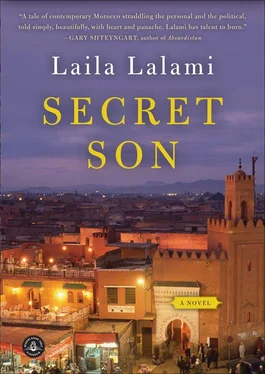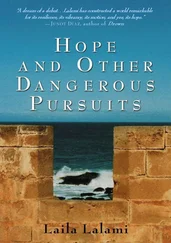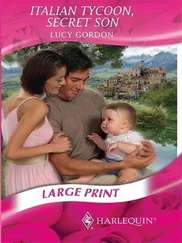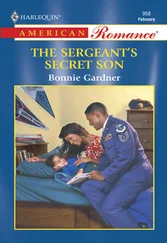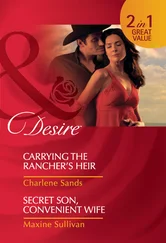“Remember me?” Maati asked.
Eyebrows smiled. “One loss wasn’t enough, you want a rematch?”
Maati punched him. Eyebrows tried to hit back, but Abdelmajid kicked him. They kept at it, both of them, until Youssef pulled at Maati’s shirt. “He’s had enough, Maati, come on.” Amin, who had been keeping a lookout, said it was time to go, the boy had learned his lesson. Magnanimously Maati let Youssef pull him off, though he seemed unable to resist one last threat. “Don’t ever come around Hay An Najat again, you hear me?”

Friday came, at last. Youssef sat in the back of the bus, clutching the paper Alia had given him. On the loudspeaker an old song by Abdelhahim Hafed played, which put him in a romantic mood. Alia was unlike any other girl at school, so independent, so sophisticated. Thinking of her gave him an erection, which he covered with his notebook. As he was about to get off the bus, he heard the announcer say that “Ahibbik” had been performed by Abdou Cherif. That smooth voice could have fooled anyone, Youssef thought.
Outside, paved streets met at sharp angles, tracing a neighborhood that harbored none of the mystery of his side of town. Tree branches overflowed from behind garden walls — lemon and orange trees, red hibiscus, and purple bougainvillea. The street was quiet, except for the sound of water splashing in the distance and children laughing and calling out to one another to jump into the pool. When he arrived at Alia’s house, a teenage maid in a faded blue housedress opened the gate for him.
He followed her up the slate path into a high-ceilinged vestibule. On the left-hand side was a formal living room, with damask-covered divans, a handwoven rug, and heavy velvet curtains. A painting of horsemen in full regalia, their rifles in the air, hung on one wall. On another was a framed family photograph: a patriarch and a matriarch, seated; around them, four handsome couples; and then children of all ages, among whom Alia. He tried not to stare, to act as though he entered homes like this every day.
Once he heard her bounding down the staircase in her heels, he quickly returned to his spot in the vestibule. “Youssef,” she called out, and for a brief moment, standing in that room, with his name on her lips, he felt as though he had always known her, had always been a part of her life, had always belonged to her world. “Let’s sit outside,” she said, leading the way into the garden. “Do you want something to drink?” she asked. Without waiting for him to respond, she turned to call the maid. “Fatiha! Can you get me a Coca?” She turned toward Youssef to see if he wanted something.
“A Coca for me, too, please.”
“So,” she said, finally sitting down on one of the wrought-iron chairs. “The old Hammouche wants a paper on family-law reforms. Do you think she’s trying to get rid of her husband?” She let her chin rest on her palm and smiled. She had not brought any books, papers, or pens, but Youssef took his notes out of his bag. He had read all the suggested articles, including the full text of the law, and he had painstakingly written ten pages of notes. It was all to impress her, of course. She glanced at his work. “You’ve done it all already! You like school, don’t you?”
“You don’t?”
“I don’t know how long I’ll be staying in university.”
Before he could ask her what she meant, a middle-aged man in a white shirt and black pants came up the garden path toward them. “Bonjour,” he said.
“ Bonjour,” Youssef replied, getting up and stretching out his hand.
“Papa, this is Youssef, a copain de classe,” Alia said by way of introduction.
“Youssef comment? ”
“El Mekki.” Youssef knew well that such a name did not count in this man’s eyes: it was not a chorfa’s name; it did not have a pedigree. From the look in Mr. Alaoui’s eyes, Youssef could see that he had been sized up and found wanting.
Mr. Alaoui said he was on his way downtown and asked whether Alia needed anything. “Nothing, thank you,” she said, getting up to kiss him on the cheek. Youssef did not speak until after he heard the roar of her father’s car outside.
“Your father doesn’t mind you having me around?”
“Why?”
“Why?” he repeated, feeling foolish.
“He knows that nothing could happen between us, if that’s what you’re asking,” she said. The casualness in her voice stung him. And why not? he thought.
“Besides,” she said, “I’m already engaged.”
“But how old are you?”
“Nineteen. I’ve been engaged since high school graduation,” she said, waving her hand. A diamond solitaire shone on her ring finger. He had never noticed it before, or if he had, he hadn’t thought of its significance. “We’ll have the wedding in June, when my fiancé finishes school,” she said. “Then I’ll move to Agadir with him.”
Why are you at school? Youssef wanted to ask. Why are you bothering to take a degree? And the most important, the most pressing question of all: Why am I here? The maid brought the drinks to the table, giving Youssef a half smile. Something in her expression made him wonder whether she had recognized him for who he was. He straightened his back and drank carefully, afraid to make one false move and reveal himself. Alia took her glass and chugged. She stretched her legs on the chair next to her. He could see part of her exposed thigh, all the way up to that soft, dark place he desired. He had to fight the urge to touch her.
“It’s too hot out here,” she said after a while. “Let’s go up to my room.”
He followed her docilely, dizzy with the possibilities that filled his mind. They sat on her sofa and she turned the TV on to a music channel. They watched pop singers, European, Middle Eastern, and American, taking turns gyrating for the camera. Soon he let his arm rest on her shoulders, then on her knee.
She turned to look at him. “What are you doing?”
“You don’t want me to?”
She blinked.
He took this to mean yes, and before he knew it, his lips were on hers. He tasted her, the sweetness of the Coca-Cola still lingering on her tongue. Blood rushed to his head and his groin, leaving him nearly breathless. He put his hand on her waist; she drew him closer. He tried to ignore the pain in his chest, but it was too much.
“What is it?” she asked.
“I fell,” he lied, “and my chest hurts.”
“Oh,” she said. “Lie down, then.”
At that moment, everything around him receded into the background. The only sound he could hear was that of his own heart, beating in his ears. Fingers trembling, he unbuttoned her shirt and slipped it off her shoulders. When she reached for his pants, he felt he had been dropped right into one of the movies he had watched over the years, playing the part of the hero, the one who gets the popular girl. He slid into her, the warmth of her enveloping him so completely he had to take deep, long breaths in order to hold on. Over and over, he ran his hands on her hips and thighs, her breasts and her waist, wondering whether the moment was real. As he reached his climax, he felt like a warrior who had, at long last, conquered the country he coveted.
Afterward, as he lay on her bed, dreamily realizing what had happened, she gathered her shirt and skirt and went to her bathroom. He heard her wash herself, the water running for a long time. When she came back into the room, she was dressed again, a cigarette in her hand. She looked at her watch.
Reluctantly, he started to put his clothes back on. “When will I see you again?”
“I don’t know,” she said. “We’ll have to wait and see.”
Читать дальше
